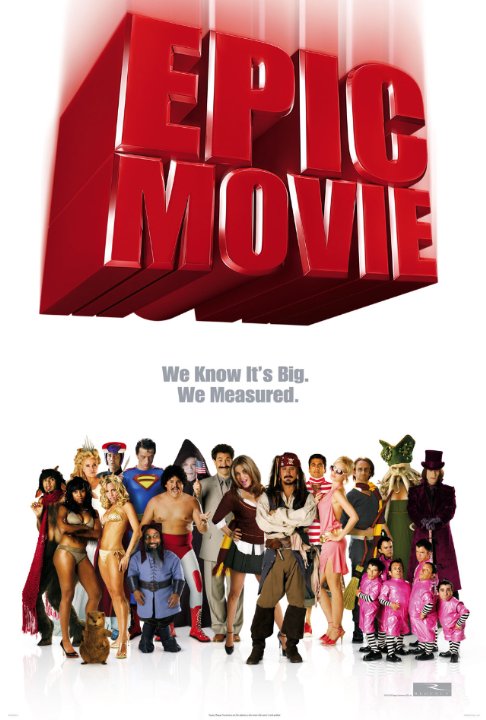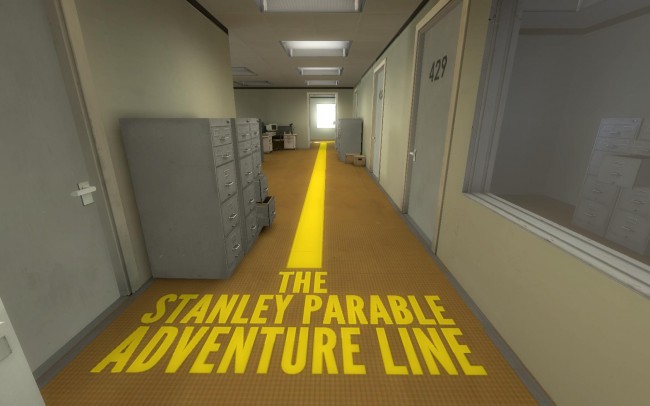For a game that claims to be about free choice and determinism, The Stanley Parable sure fails on every account to engage in a meaningful philosophical dialogue. It makes me sad to see such a potentially compelling narrative medium wasted on a boring, pretentious, and unambitious storyline. The game is cute and a little funny, but that’s all it ever ends up being. It tries very hard to be deep and clever and philosophical, but the writing makes it pretty clear that the author hasn’t read a single hard book in his life. What good is “intellectual humor” written by a non-intellectual?
The closest thing to “philosophy” we see in The Stanley Parable is in the narrator’s musings, but these musings are pretentious, apeish, and uneducated. Show any serious academic or even a hardcore armchair theorist the lines in The Stanley Parable and they’ll just laugh at you. The script — and the choices in the game — are completely meaningless, and not the good, Albert Camus type of meaningless, but more like the Epic Movie kind of meaningless. All the endings of the game, from “The Good Ending” or whatever you want to call it to any of the various “Rebellion/Confusion Endings” are completely superficial and devoid of content.


The narrator occasionally asks dumb, pseudointellectual questions like, “is the journey without a destination a journey at all?” — Good question! How about you try to actually answer it instead of just dropping it, you idiot? Was this supposed to be deep? Why does the narrator even ask these dumb questions if the writer never bothers (or indeed, is intellectually incapable of) seriously considering or answering them? There are few good writers who can get by with questions alone, and I think it’s pretty obvious that the writer of The Stanley Parable is nowhere near talented enough to do this.
Probably the biggest philosophical red flag in The Stanley Parable is when the narrator goes into nonsensical, tautological rants about existence that use a made-up “intellectual” vocabulary that you would never see in any serious writing. You know how scientists and engineers absolutely hate it when Hollywood movies use made-up computer jargon and sciencey words in important scenes?
“I’m making a GUI interface using visual basic to track the killers IP address”
Well, it turns out that there’s a STEM analogy to Hollywood Science, and it’s called Engineer Philosophy. The author of The Stanley Parable is clearly interested in philosophy. Indeed, he may be so interested as to talk about philosophy on his weekends at the bar from time to time, and maybe even on Reddit when he’s bored. But such idle, armchair discussion about philosophy was clearly not enough. The writing in The Stanley Parable only ever goes through the motions, mimicking the articulation and gestures and intonation of “intellectual comedy” without producing the cerebral content to back it up. Listening to the Latinate-ridden narration in The Stanley Parable is like watching someone pretend to speak English.
In the end, The Stanley Parable is basically the snarky writing and free will narrative of Portal without any of the cleverness and philosophically compelling dialogue that made the game good in the first place. Oh, and of course, Portal was actually a fun game. To be more fair to the developer, let’s compare The Stanley Parable to an indie game: Hotline Miami was a 2d indie game made in Game Maker by a Swedish guy, and it is not only cheaper to buy but also leaps and bounds more fun and better-written than this overhyped superficial junk.
The Stanley Parable is cute. And it’s arguably funny. But at its heart, it is only a pale imitation of philosophical humor, a shadow made by a cave-dweller. If you want to play a deep, funny, and clever video game about free will, then just play Portal instead. And if you want to enjoy an indie game about free will, then play Hotline Miami. And if you want to read a deep book that is funny, clever, philosophical, and also about free will, then read Notes from Underground. But please do not play The Stanley Parable. There is nothing fun about listening to the rambling philosophy of an uncultured and unworldly engineer. PSA to any literature-inclined STEM majors reading this post: do not blindly parrot the words of philosophers when the last book you touched was Orwell’s 1984 in a 9th grade English class.


[…] Mir ist kein Spiel bekannt, dass dieses Prinzip so deutlich macht wie die Stanley Parable. Wen sich darüber beschwert wird, dass die Stanley Parable sich dem Thema der “freien WahlR…, dann liegt es eher daran, dass nicht verstanden wird, es geht nicht darum was im Spiel passiert, […]
Spot on mate, perfect review. This game is nowhere as smart as it thinks it is. It’s not a philosophical essay because it has nothing to say and it answers none of the questions it raises (and appart from existencialism, it doesn’t wonder about anything else). It’s not an absurd piece such as “waiting for godot” because the dev probably doesnt get a single thing about surrealism and I’m not even sure if he knows the concept has been around for close to a hundred years. It’s not a video game because there is no interaction and no aim or goal. I was kinda into it at first, and quickly got tired of the thing when I realised that it had nothing to say, it just aimlesly wanders and spells wise, all the while calling you an idiot and as you said, using as much “smart” words and high brow concepts as possible to hide it’s utter emptyness, void and superficiality.
The trick worked for a lot of people, but it left me going MEEEEH, no big deal, the dev is just another mediocre guy trying to pass off as an intellectual genius : been there, done that, NEXT.
Portal was twice as deep and nowhere near as pretentious : it never pretended it was about philosophy, it just hinted players, in a much more subtle and succesful way. Portal 1/2 are the only “smart” games out there, nothing ever came close.
damn dude all you had to do was say you didnt like the game it didnt require 200 lines of text to convey.also you act like philosophy is some crazy complex subject when it really isnt. i like philosophy but i will have to disagree with you that it takes a genius or high intelligence to write down your philosophical ideas or comprehend them. you said it makes STEM people mad when movies talk technobabble, well thats not even a fitting comparison since a lot of stem fields DO require an astounding iq to understand and a lot requires thousands of hours of work to digest. how dare you compare yourself to an engineer
coming from a TSP fan, i do have to say the game is more meant for simple minded people and or just people who are easy to please and find interest in very small things, and as the game is also kind of a kids game its obviously going to be a bit basic or bland, but i find all your points fair and im sorry u didn’t enjoy the game, i hope u got a refund and find a game that suits you, sorry this reply is kind of bland just felt like to many people of the TSP fandom were being mean, also best thing to do is to look at someone playing the game for a few minutes first to see if u like it, anyway sorry to bother u with this useless reply and i hope u have a great day or night!
I appreciate the strong sentiments in your article about TSP. I played the game based on its largely positive reviews and while I appreciated the deeper aims of the game, to be honest I found myself put off by what felt like a heavy handed, even patronizing philosophical approach to storytelling. For me, what was most bothersome was the narrator saying things like “Stanley was now thinking X”. It felt almost insulting to think that the game played out as if it knew what the gamer is thinking. I actually enjoy novels with angsty internal monologues, but I think the reason this technique fails in the video game medium is that we, the gamer, are the character, and our own motivations–not the ones dictated by the story writer–are what progresses the character.
I like your allusions to the Portal series regarding the topic of free will. Actually, I felt that “Spec Ops: The Line” is also successful with this subject. Towards the end of this game one of the characters argues that by reaching the end, the main character–eg, the player–made the conscious choice on his own to make it that far. And it hits us that he’s correct. Because the only reason we are hearing him say these lines is because we decided to play the game long enough to get there. I regret that I experienced no such epiphanies with the Stanley Parable, and I am glad to know that my opinion is not unique.
You are one of the worst kinds of human beings right now: the hip cynic, the short-sighted fool that’s so busy trying to find the trendy thing to hate that you fail to appreciate anything that does not match your world view. I highly doubt you played the game, otherwise you would have realized that it literally says in the game itself that its philosophic ramblings are nonsense. You write like you have taken one intro semester class on philosophy. They even responded to a critique similar to yours:
But go on, grace us with your wisdom and god forbid that we disagree with you. It’s fine that you don’t like the game, but attacking someone because they are in a STEM field and cannot possible know anything about philosophy is ” pretentious, apeish, and uneducated ‘ .
@Charles Genuinely curious to know why you think the two critiques are even remotely similar? You fail to address any of the points made in this review, and then go on to state that because he disagrees with you must not have played the game, going on to do exactly the same thing you are criticizing the author for. I fail to see how stating in the narrative that it is meant to be nonsense makes the game any less shallow.
Btw, nowhere in the review does the author say that people in the STEM field know nothing about philosophy, just that there are equivalent people to those who use “Hollywood science”, and the writer of this game is one of them.
Charles, I’m going to take a page from the “Stanley Parable fans’ book of responding to criticism” and argue that you only disliked this review because you weren’t able to understand it. Aww shucks, that wasn’t very fun, was it?
Oh, so the game itself says that the philosophical ramblings are nonsense? I guess that invalidates any criticism then. Just like the guy in this cartoon: http://i.imgur.com/75jRk.jpg
So we have a game with no gameplay to make a point, except that the point is that there is no point. Sounds to me like the only way to win the Stanley Parable is not to play it. In fact, my favorite secret ending to Stanley Parable was when I uninstalled it and got a Steam refund.
I don’t agree. In fact I think YOU are a very dangerous person. People like you, who revel in mediocrity on a daily basis and don’t have the means to push the enveloppe, even by a tiny little lenght, people who encourage others to dwell in intellectual garbage all day long and call people with higher intellectual aspirations “snobs and pretentious hipsters” are culture’s worst enemy. You wanna be a shallow being all your life, go to macdonalds, sit in front of netflix all day long and you don’t like using your head to try and understand what’s happening around you, KNOCK YOURSELF OUT. However don’t you dare insult people who think your behaviour is sterile and doesn’t make anything evolve. Stick to pop culture and stay out of fields you don’t belong in. People like us aren’t campaigning against people like you who chose not to think about anything (because thinking is hard and takes efforts), suit yourself. You remind me of communist times, were intellectuals were shot or put in jail because they represented a major threat to the powers that where. Extremely dangerous people. PS : it’s “cynical”, not cynic, don’t use words if you don’t understand them, it makes you look like stanley parable’s dev : a pretentious fool.
Cynic does work in his case though? Not saying he’s correct about you being a cynic but his usage doesn’t mean he’s necessarily wrong.
If you tried to use cynical in what he said it would be worded poorly. You are a hip cynical? Doesn’t really work well. Don’t try too hard to seem smart makes you look dumber.
[…] the point where some people even came to find it pretentious. Jonman wrote a piece on this subject, Why “The Stanley Parable” Sucks and the Problem of Engineer Philosophy, and it was clear to me that he had expected the philosophy of the game to be told to you, in […]
This review is about the Ultra Deluxe version of TSP. I bought this game (if it can even be called that) because I’d read good things about it on a few sites. And after watching the (spoof) Raphael trailer (is that even the right word?), which I found very funny, I decided to buy the game.
Damn, what a disappointment. I only played it for about an hour and requested a refund, which I received today. I was expecting the game to be very funny throughout, but apart from the joke about the code for the keypad on the wall (which the narrator repeatedly tells you and which you don’t need anyway) and a comment about aimlessly and futilely pressing buttons trying in vain to stop a timer counting down to zero, I don’t remember anything else I found amusing. Basically the funny bits are few and far between.
Overall I found the game boring because it’s ludicrously repetitive, there’s very little interactivity, the narrator will not shut up, there doesn’t appear to be a point to the game (unless it not having a point IS the point, in which case it’s not my cup of tea) and worst of all you keep getting thrown back to the start of the game. After this happened 4 or 5 times, I’d become sick to the back teeth of the game and stopped playing it and requested a refund.
I’ve grown very tired of games that involve shooting people/zombies/monsters and was therefore looking for a different type of game, but TSP is definitely not what I was after. Before TSP, I played Dear Esther and I found that boring as well. If anyone can suggest non-shooting games that are actually good, engaging and enjoyable I’d be grateful.